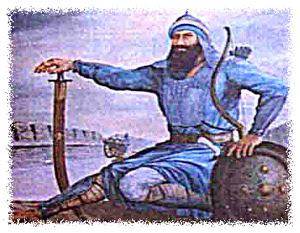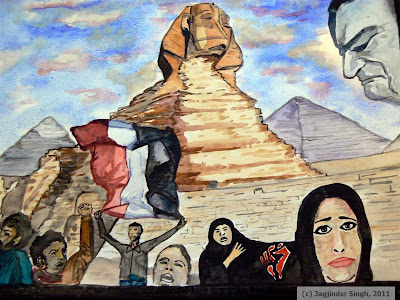Shaheedi on 25th June - Baba Banda Singh Bahadar Ji

Baba Banda Singh Bahadar Ji
Baba Banda Singh Bahadar Ji, the great disciple of Guru Gobind Singh Sahib, rose up in arms against tyranny in the footsteps of his master to defend and safeguard humanity. He had set an example of supreme sacrifice by under going an untold misery and torture at the hands of the Mugal rulers.
Baba Banda Singh Bahadar Ji, the great disciple of Guru Gobind Singh Sahib, rose up in arms against tyranny in the footsteps of his master to defend and safeguard humanity. He had set an example of supreme sacrifice by under going an untold misery and torture at the hands of the Mugal rulers.
Baba Banda Singh Bahadar Ji was born in Rajouri. He settled on the banks of the Godavri, near Nanded. It was here that Guru Gobind Singh Sahib met him. Banda ‘Bairagi’, as he came to be known, was greatly impressed by the 10th Guru and took “Khande Di Pahul” from him. He was ordered by Guru Sahib to go back to Punjab and help the people of the state to fight against atrocities.
Baba Banda Singh Bahadar Ji came to Punjab like a storm, sent message of Guru Gobind Singh Sahib to various places to Khalsa, raised an army of the selfless Sikhs under numbers of commanders of Sikhs. Banda Singh Bahadar Ji established his capital at Mukhlisgarh, a place on the border of Nahan in Himachal and Jagadhri in Haryana. In reverence to the hukamnama of Guru Gobind Singh Sahib, many disciples of the Guru Sahib came under his command to fight against the Mughal rule in Punjab. Baba Banda Singh Bahadar Ji attacked Samana and put Sayyed Jalaludin, the executioner of Guru Teg Bahadar Sahib, to death. His brothers Sashal Beg and Bashal Beg were the executioners of the younger Sahibzadeys, who also lived at Samana. Baba Banda Singh Bahadar Ji also attacked Sadhaura and punished the Mughal chief Usmaan Khan and his accomplices responsible for the death of Pir Budhu Shah and his family.
Baba Banda Singh Bahadar Ji, after capturing Banur, marched towards Sirhind and defeated Subedar Wazir Khan in Chapar Chiri, near the present-day town of Landran. It was on May, 1710, that Wazir Khan was killed in a fierce battle. Thereafter, he captured Sirhind and avenged the death of the innocent Sahibzadeys.
Bhai Mani Singh was requested to take up services of Darbar Sahib (Harmandar Sahib), Amritsar and he thankfully accepted. Thus it was first time, in the history of India that after a slavery of more than 700 years, a Sikh Raj was established at Sarhind in the heartland of the Mugal Empire in 1710 AD by Baba Banda Singh Bahadar Ji. He also abolished the system of “Zamindari” and gave land to the actual tillers. He proclaimed equality of all people as citizens of a state and declared that power emanated from and justly belonged to the people and not to a hereditary privileged class. Thus, he became the Messiah of the downtrodden and small farmers.
When in need King Bahadar Shah, had fallen at the feet of Guru Gobind Singh Sahib, and now in Dec 1710, ordered that Sikhs, wherever seen, be killed. In June 1711, Bahadar Shah sent his army to kill Baba Banda Singh Bahadar Ji in the field of Behraam pur, but got defeated. Within two years Banda Singh Ji conquered almost east of Punjab including Jamna Nagar, Saharanpur, Patiala, Ambala and other nearby areas. He moved to wards Himachal and conquered Bilaspur. Again in 1713 he defeated the Mugal Army in the field of Sadhaura.
He was enemy of the cruel rulers, chieftains and landlords who treated general public as slaves. He started currency (coins) in the names of Guru Nanak Dev Sahib and Guru Gobind Singh Sahib. Thus it was a first successful war of freedom. The fear and terror of the dreaded Gaznzvi, Temur and Baabar and their descendants was eliminated by the Khalsa. Though the rule of Banda Singh Ji was only for 8 years it paved the way to stand up against the terror of rulers.
Martyrdom of Banda Singh Bahadar Ji.
After the death of Bahadar Shah in 1712, Farakhsieyer became the next king of India. At the behest of Farakhsieyer, in Dec 1715 Baba Banda Singh Bahadar Ji , along with a few hundred Sikhs, was encircled in the fort of Gurdaas Nangal. After about 8 months the fort was attacked and Banda Singh and his men were arrested. Thousands of Sikhs were killed and their dead heads were loaded in number of carts. About 700 Sikhs were arrested on the way. They were brought to Delhi in the form of a big horrifying procession leading with Baba Banda Singh Bahadar Ji in a cage over an elephant, prisoners in chains and carts with dead heads. It was a clear message that the Sikhs had no right to live. In March 1716, daily 100 Sikhs were executed for 7 days at Khooni Darwaza, Delhi. Not even a young boy of 15 years, even at the yearning requests of his mother left Sikhism but embraced Death. They were lured to temptations but the brave Sikhs rejected all offers and embraced martyrdom without apology or remorse. After 3 months, in June 1716 AD Banda Singh Bahadar Ji and his few men were executed.
The Mughals were mad for knowing about the secrets of Sikh wars from Baba Banda Singh Bahadar Ji and his few men. Before execution of Baba Banda Singh Bahadar Ji his young son was killed with a dagger. Vibrating heart of the dead child was forced into the mouth of brave Baba Banda Singh Bahadar Ji and he resisted. After this his eye balls were notched out, hands, feet, and knee were chopped off. As if not enough with long hot tongs his flesh was pulled and was thus ultimately put to death. He neither apologised nor did he show agony in the face of untold misery. The events were recorded not only by Muslim historians like Khafi Khan, Mohammed Harisi and Mohammed Kasim Lahori but also by East India Company officials John Sarman, Edward Stephenson and Hugh Barker, who sent reports to Governor Robert Hadges at Fort William at Calcutta. This was to set an example to create terror in the minds of the general public by the rulers.
Rabindra Nath Tagore gave a befitting tribute to Baba Banda Singh Bahadar Ji in his poem entitled “Bandi Bir” in Bengali. As a tribute to the victory of Sirhind on his martyrdom. The poem eulogises him as great warrior and true disciple of Guru Gobind Singh Sahib. This poem became the anthem for the revolutionaries of Bengal, especially during the freedom struggle of India. But it is an irony of fate that until today the great warrior did not get due recognition in Punjab itself. Today we hardly celebrate the first-ever victory of the Sikhs at Sirhind to commemorate his death anniversary.

Comments